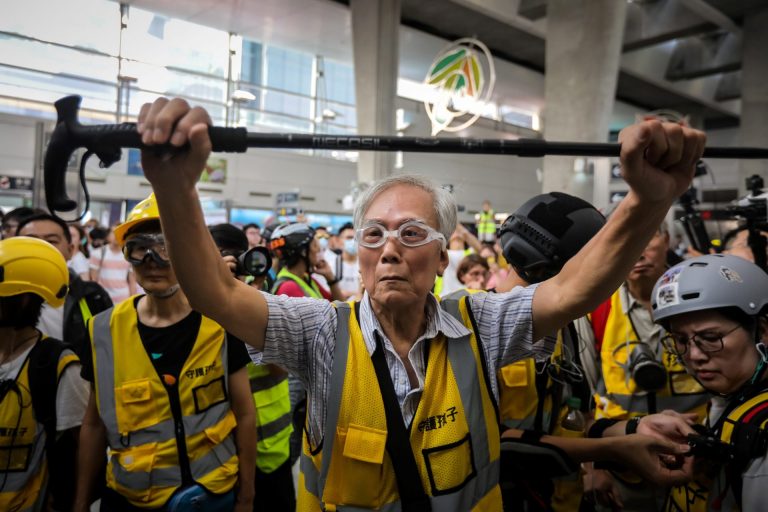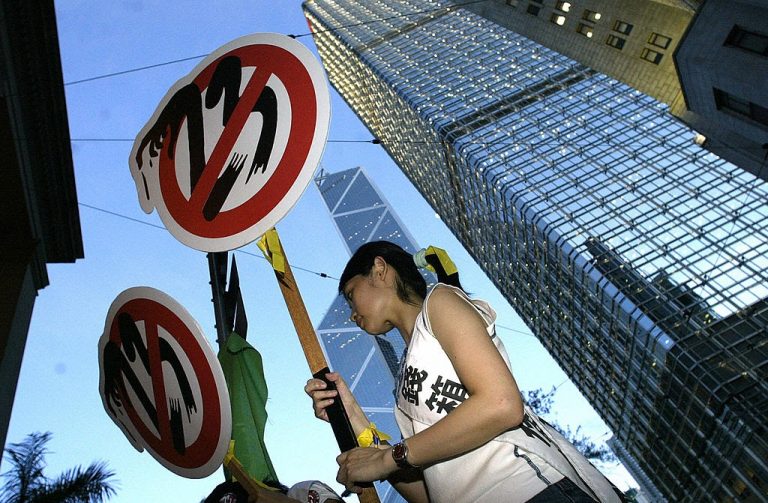On June 30, 2020, Hong Kong’s National Security Law was passed, which was opposed by both the UK and U.S. governments and which negated the promised “One Country, Two Systems” balance between Hong Kong and Beijing. The Chinese government said it was necessary to instate it following a year of protests against continued encroachment on Hong Kong’s freedoms from Beijing.
Many expressed that the National Security Law erased Hong Kong’s freedoms and returned Hong Kong to Communist Party rule and massive protests further consumed Hong Kong. Under the National Security Law, convictions for crimes including “foreign interference,” “secession,” “terrorism,” and “subversion of state power” bring a minimum of 10 years in prison, and those who have committed these crimes can be spirited away to the Chinese mainland for trial.
Concerns have been raised that the law has drastically altered the rule of law in Hong Kong, to the point that citizens who had voted in public pro-democracy primaries held in July to help democracy-oriented politicians determine the best candidates for last fall’s elections were criminalized, among others.
As early as July, some Hong Kong citizens and businesses began aligning their behavior to comply with Beijing’s dictates for fear of repercussions, while others held to the democracy they had been born under. At this time, Reuters reported that HSBC wealth managers began to scan their list of customers to determine which clients had connections to the democracy movement. HSBC was cited by Hong Kong watch as having frozen the accounts of democracy activists or those sympathetic to them and was required to appear before the UK Parliament last Tuesday.

HSBC Chief Executive Noel Quinn, as well as compliance chief Colin Bell, was grilled by the UK Parliament on Tuesday, Jan. 26, for freezing assets belonging to pro-democracy activists. Quinn responded to an inquiry by the Parliament’s Foreign Affairs Committee regarding his bank’s compliance with the debanking of individuals with democratic affiliations in Hong Kong. While Quinn denied accusations that accounts had been frozen for individuals associated with the democratic party, he explained that he freezes accounts under the direction of the local police authority.
Success
You are now signed up for our newsletter
Success
Check your email to complete sign up
The meeting with the UK Parliament Foreign Affairs Committee came after notable figures, including Ted Hui — a high-profile democracy activist who is a former member of the Hong Kong Legislative Council — and Pastor Roy Chan found their bank accounts frozen. Chan’s church provided aid to protestors, for instance, the church helped to encourage a team of elderly citizens who acted as human shields during police responses to young protestors. Billionaire and former news organization owner Jimmy Lai, who has been a pro-democracy activist since at least 1989, has also had his HSBC account frozen.

Despite Quinn’s denial, in light of the aforementioned Reuters report of screenings from HSBC wealth managers last July, the alignment of HSBC is being called into question. Benedict Rogers, the founder of Hong Kong Watch, was reported on the Sunday preceding the parliament inquiry as saying: “HSBC now faces a choice: does it want to be a global bank or a CCP-controlled bank. It cannot be both.”
A further question posed by the UK Parliament was whether HSBC has any knowledge of Chinese Communist Party (CCP) branches existing within the company, as it would be a requirement in China to have Party members working in the firm “to seek to influence the strategic direction of the company.” Mr. Quinn denied any knowledge of CCP members working within HSBC or of any requirement China has on companies operating in the country. However, Mr. Quinn later recalled during the interview that a leaked list of CCP members working in senior positions in corporations or global government capacities was exposed last month.
HSBC was reported to have over 300 employees that are CCP members
Mike Pompeo, while acting as the U.S. Secretary of State, accused HSBC of being “Corporate Kowtows” in June after the company endorsed the National Security Law. This contrasts with Quinn’s claim that they “do not take exit or freezing decisions based on political affiliation or political activity.”
Hong Kong customers hold more accounts with HSBC than any other country, with 55 percent of its profits coming from the territory and further aspirations of growth in Asia. China is seen as a key market as the bank is shifting assets from Europe, the UK, and the U.S. Bloomberg reported recently that top bankers at HSBC are being groomed for a “Make or Break” move into CCP-controlled China. Last summer, China warned HSBC in a veiled manner, citing it for collusion with the West to assemble the case against Huawei CFO and deputy chairwoman Meng Wanzhou. HSBC denied the allegations last July, the same month that Reuters reported the bank was making a list of Hong Kong democracy activists.
In observing the long conflict between totalitarian interests and the free world, it has long been noted that individuals and companies often do the right thing as a matter of principle, but then cave when they are called out, threatened, or labeled for it. Is this revealing a disconnect between inherent ethos and top-down direction?
Ted Hui, a former member of the Hong Kong Legislative Council, fled his home in early December and is currently seeking asylum in the UK after criminal charges, including money laundering, have been brought against him under the National Security Law. HSBC froze Hui and his family’s accounts early last month, which totaled hundreds of thousands of dollars. Hui said this was done after he fled Hong Kong, according to a Reuters article shared by Singapore’s Today Online.
The article mentioned that China denies curbing freedoms in Hong Kong, while democracy activists say conditions in the territory have become even worse after the passing of the National Security Law, and in a December 2020 statement that did not name Ted Hui but which appeared to be in part a reference to Hui’s escape overseas, the Hong Kong Security Bureau said “running away by jumping bail and using various excuses such as so-called ‘exile’ to avoid one’s responsibility is a shameful, hypocritical and cowardly act of recoil.”
Roy Chan, Pastor of the Good Neighbour North District Church, had his and the church’s HSBC accounts frozen in December
The church is known for its group called “Protect the Children,” which was formed by primarily middle age and elderly members that would act as a human shield between democracy protesters and the Hong Kong police force. Mr. Chan had charges of money laundering and fraud brought against him. He is currently in exile with his wife in the UK and does not believe he will be able to return to Hong Kong. According to Radio Television Hong Kong, Chan said the hold on the church’s bank account had made it unable to pay rent for the church’s homeless hostels, salaries for social workers, and had further affected volunteer services. He said that he and his wife’s personal accounts were also frozen and that they are not sure how they will be able to pay their way in exile.
Billionaire entrepreneur Jimmy Lai still remains in Hong Kong after his HSBC accounts were frozen and after his arrest under charges of “conspiring and colluding with foreign forces to endanger national security.” The former owner of the news organization Next Media and the founder of Apple Daily has been a pro-democracy activist since the Tiananmen Square massacre in 1989. After a short release on an appeal after which he was arrested once again in December, the 72-year-old Lai has recently been released on bail under the conditions that he not use social media and not grant interviews.
Follow us on Twitter or subscribe to our email list













